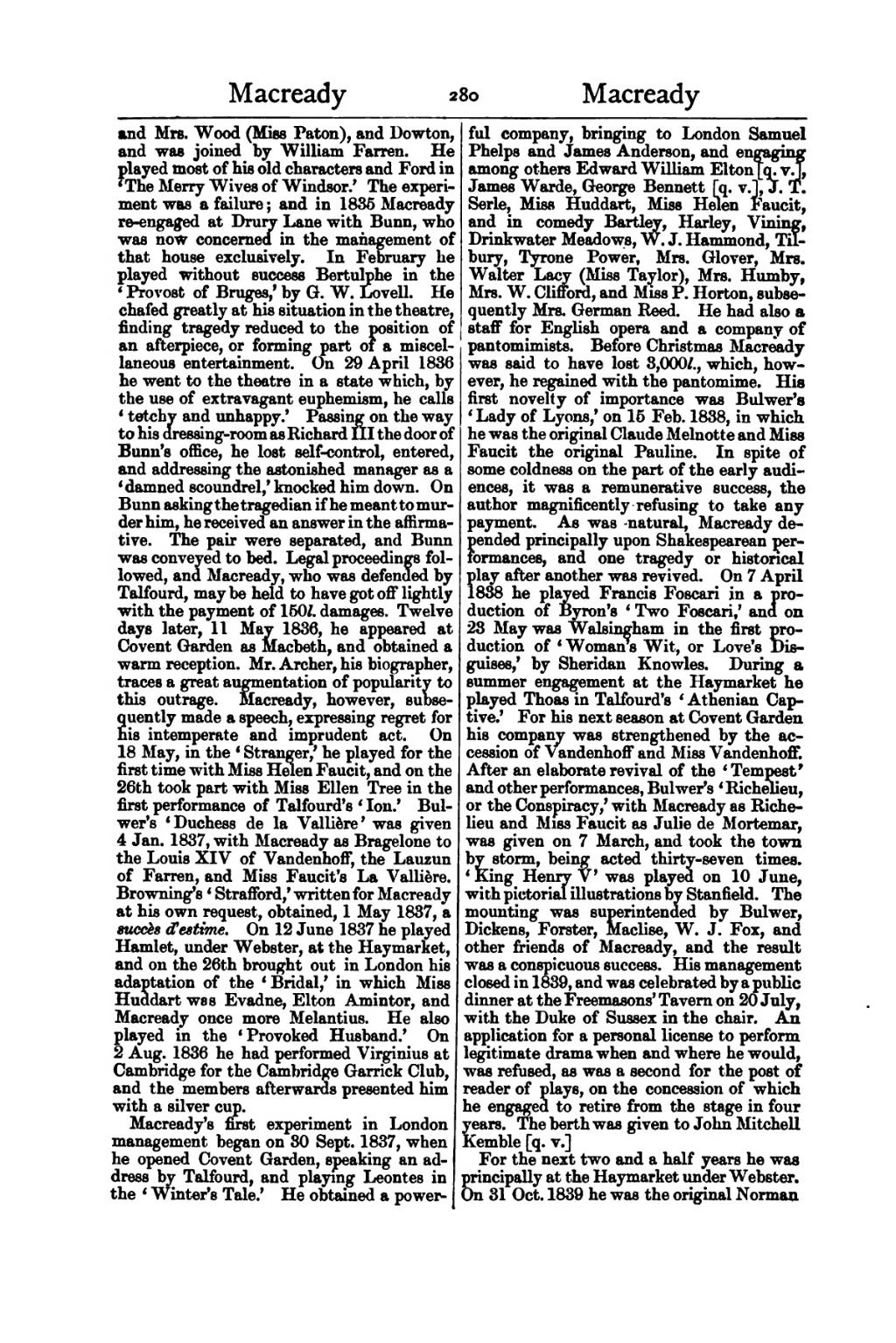and Mrs. Wood (Miss Paton), and Dowton, and was joined by William Farren. He played most of his old characters and Ford in 'The Merry Wives of Windsor.' The experiment was a failure; and in 1835 Macready re-engaged at Drury Lane with Bunn, who was now concerned in the management of that house exclusively. In February he played without success Bertulphe in the 'Provost of Bruges,' by G. W. Lovell. He chafed greatly at his situation in the theatre, finding tragedy reduced to the position of an afterpiece, or forming part of a miscellaneous entertainment. On 29 April 1836 he went to the theatre in a state which, by the use of extravagant euphemism, he calls 'tetchy and unhappy.' Passing on the way to his dressing-room as Richard III the door of Bunn's office, he lost self-control, entered, and addressing the astonished manager as a 'damned scoundrel,' knocked him down. On Bunn asking the tragedian if he meant to murder him, he received an answer in the affirmative. The pair were separated, and Bunn was conveyed to bed. Legal proceedings followed, and Macready, who was defended by Talfourd, may be held to have got off lightly with the payment of 150l. damages. Twelve days later, 11 May 1836, he appeared at Covent Garden as Macbeth, and obtained a warm reception. Mr. Archer, his biographer, traces a great augmentation of popularity to this outrage. Macready, however, subsequently made a speech, expressing regret for his intemperate and imprudent act. On 18 May, in the 'Stranger,' he played for the first time with Miss Helen Faucit, and on the 26th took part with Miss Ellen Tree in the first performance of Talfourd's 'Ion.' Bulwer's 'Duchess de la Vallière' was given 4 Jan. 1837, with Macready as Bragelone to the Louis XIV of Vandenhoff, the Lauzun of Farren, and Miss Faucit's La Vallière. Browning's 'Strafford,' written for Macready at his own request, obtained, 1 May 1837, a succès d'estime. On 12 June 1837 he played Hamlet, under Webster, at the Haymarket, and on the 26th brought out in London his adaptation of the 'Bridal,' in which Miss Huddart wss Evadne, Elton Amintor, and Macready once more Melantius. He also played in the 'Provoked Husband.' On 2 Aug. 1836 he had performed Virginius at Cambridge for the Cambridge Garrick Club, and the members afterwards presented him with a silver cup.
Macready's first experiment in London management began on 30 Sept. 1837, when he opened Covent Garden, speaking an address by Talfourd, and playing Leontes in the ' Winter's Tale.' He obtained a powerful company, bringing to London Samuel Phelps and James Anderson, and engaging among others Edward William Elton [q. v], James Warde, George Bennett [q. v.], J. T. Serle, Miss Huddart, Miss Helen Faucit, and in comedy Bartley, Harley, Vining, Drinkwater Meadows, W. J. Hammond, Tilbury, Tyrone Power, Mrs. Glover, Mrs. Walter Lacy (Miss Taylor), Mrs. Humby, Mrs. W. Clifford, and Miss P. Horton, subsequently Mrs. German Reed. He had also a staff for English opera and a company of pantomimists. Before Christmas Macready was said to have lost 3,000l., which, however, he regained with the pantomime. His first novelty of importance was Bulwer's 'Lady of Lyons,' on 15 Feb. 1838, in which he was the original Claude Melnotte and Miss Faucit the original Pauline. In spite of some coldness on the part of the early audiences, it was a remunerative success, the author magnificently refusing to take any payment. As was natural, Macready depended principally upon Shakespearean performances, and one tragedy or historical play after another was revived. On 7 April 1838 he played Francis Foscari in a production of Byron's 'Two Foscari,' and on 23 May was Walsingham in the first production of 'Woman s Wit, or Love's Disguises,' by Sheridan Knowles. During a summer engagement at the Haymarket he played Thoas in Talfourd's 'Athenian Captive.' For his next season at Covent Garden his company was strengthened by the accession of Vandenhoff and Miss Vandenhoff. After an elaborate revival of the 'Tempest' and other performances, Bulwer's 'Richelieu, or the Conspiracy,' with Macready as Richelieu and Miss Faucit as Julie de Mortemar, was given on 7 March, and took the town by storm, being acted thirty-seven times. 'King Henry V' was played on 10 June, with pictorial illustrations by Stanfield. The mounting was superintended by Bulwer, Dickens, Forster, Maclise, W. J. Fox, and other friends of Macready, and the result was a conspicuous success. His management closed in 1839, and was celebrated by a public dinner at the Freemasons' Tavern on 20 July, with the Duke of Sussex in the chair. An application for a personal license to perform legitimate drama when and where he would, was refused, as was a second for the post of reader of plays, on the concession of which he engaged to retire from the stage in four years. The berth was given to John Mitchell Kemble [q. v.]
For the next two and a half years he was principally at the Haymarket under Webster. On 31 Oct. 1839 he was the original Norman
